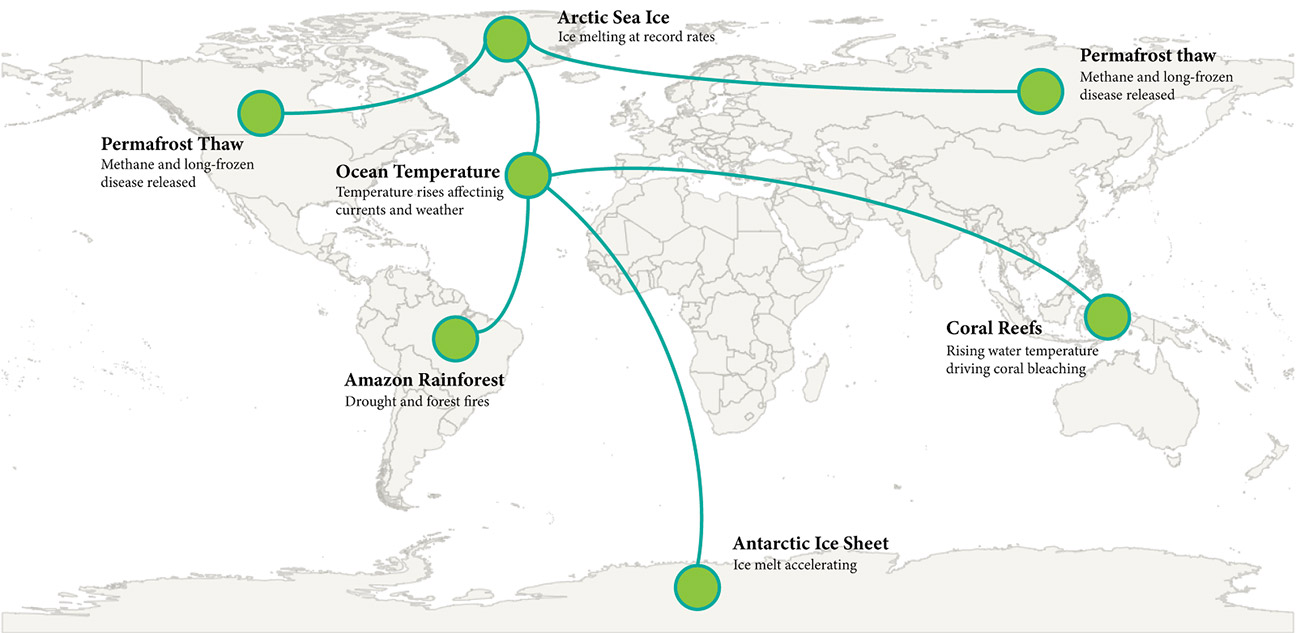A groundbreaking Global Tipping Points Report is urging governments worldwide to orchestrate transformative policies that trigger technological, economic, and social tipping-points. Authored by a team led by Tim Lenton at the University of Exeter, the report contends that incremental measures are no longer sufficient, emphasizing the critical need to accelerate climate action by catalyzing positive tipping-points.
Understanding Tipping Points:
Tipping points exist in various systems—technological, economic, political, and social—where small changes can lead to abrupt shifts into different states. The report suggests that identifying and triggering these tipping points could result in a rapid reduction of carbon emissions. To illustrate, as the Amazon becomes hotter and drier, the rainforest might transform into grassland, creating a cascading effect due to reinforcing feedbacks.
Historical Precedents and Positive Tipping Points:
The report draws attention to historical examples of rapid transitions, such as the industrial revolution and the swift displacement of horse-drawn transport by motor vehicles. Positive tipping-points have also been achieved in the energy sector, with solar and wind power becoming the cheapest forms of electricity generation in many parts of the world. However, these shifts required significant, concerted efforts, particularly in terms of investment.

Opportunities for Positive Points:
The authors point to ongoing positive tipping-points, such as the increasing popularity of electric cars in Europe and China. These transitions, however, could be accelerated by targeted policies, such as ensuring the affordability of electric vehicles compared to traditional combustion engine cars. Similarly, reducing the cost of electricity could expedite the adoption of environmentally friendly technologies like heat pumps.
The Need for Systemic Thinking:
Tom Powell, a co-author of the report, emphasizes the importance of systemic thinking among policymakers. Identifying leverage points where small interventions can yield significant results is crucial. Coordinated action is essential, and positive tipping-points do not materialize magically. Powell stresses that lessons learned from the success of solar energy underline the necessity of sustained effort and investment.
Unleashing a Domino Effect:
The report underscores that triggering one positive tipping point can set off a chain reaction, much like dominoes falling. For instance, the adoption of electric vehicles has contributed to reducing battery prices, making energy storage solutions more feasible for renewable sources. Governments, therefore, have the potential to create a domino effect that amplifies the impact of individual tipping-points.
The Call for Government Action:
Simon Sharpe, formerly of the UK government and now with the World Resources Institute, aligns with the report’s call for governments to actively aim for positive tipping points. Although not yet fully integrated into traditional economic theory, the concept of transformational change is gaining recognition, with UK government policy appraisal now featuring a dedicated section on this vital aspect.
The Global Tipping Points Report provides a roadmap for triggering positive shifts in technological, economic, and social systems. Governments must adopt a systemic approach, identifying key leverage points and implementing coordinated policies to usher in transformative change. The potential for positive tipping-points offers hope for a rapid and meaningful reduction in carbon emissions, paving the way for a more sustainable and resilient future.






